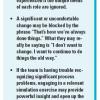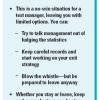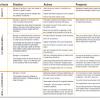|
|
Don't Let the Engine Run out of Fuel Clarke Ching's friend Gary is one of those quietly clever people who hated school, so he left as soon as he could to go work in a factory. Nowadays, years after their schoolboy days in New Zealand, Clarke works in Europe as a management consultant and Gary owns and runs a small farm in New Zealand. Their lives couldn't be more different, yet Gary taught Clarke one of the most valuable lessons Clarke has learned during his career. In this article, Clarke describes that lesson and how it has changed his approach toward dealing with customers and key players in developing a product.
|
|
 |
The Blind Leading the Blind When a team decides to go agile but its management fails to acknowledge the changes to each team member's role and provide support during the transition, frustration ensues. Find out how recognizing the needs of each new role can help smooth the way to a successful agile adoption.
|
|
|
|
Communicating with Context Danny Faught and Michael Bolton have observed that context-driven testers have a uniquely productive style of communication that they use amongst themselves. This context-driven culture might seem strange to outsiders or newcomers to the community. In this column, Danny and Michael highlight some of these specific traits that can help you communicate whether you consider yourself context-driven or not.
|
|
|
|
Study of Myers-Briggs Types Relative to CM Professionals (2007) Mario Moreira conducted a study of CM professionals to find out what similarities and differences could be found between them. He then compared those results with what he learned from a similar study he conducted four years prior, to see what has changed, and what's stayed the same.
|
|
 |
Sophie's Choice What do you do when your boss tells you to do something your conscience won't allow? Follow a test manager as she is faced with an ethical dilemma that forces her to pick between what is right and what will save her job. It's a tough position to be in, find out how to come through it with your head held high.
|
|
|
|
A Sanity Check for Job Applicants Hiring people is the most important responsibility of any manager. Hire the right person and a team can take off and soar. Hiring the wrong person can tear a functioning team apart. Yet, all too often, managers don't give the hiring process the attention it deserves. Usually we are too overwhelmed by the work that made us want to hire somebody in the first place. In this article, Peter Clark hopes to save you time by offering some tips to help you choose the right people to interview.
|
|
|
|
Preventative Medicine Is Hard to Sell Implementing a great idea takes common sense and good marketing. It also requires knowing who to motivate to implement change. In this article, Clarke Ching writes about a time when he figured out a simple solution to a complex problem that would save his employer millions, but no one seemed to care. Clarke discovered that it is far easier to sell aspirin if your customer already has a headache.
|
|
|
|
Challenges of the Part-Time Programmer Do you spend part of your time writing programs or trying to learn how to program? As you read about the advanced techniques that experienced programmers are using, you may feel as anxious as a do-it-yourselfer making abortive attempts at installing a new plumbing fixture for the first time. In this column, Danny Faught describes how even seasoned programmers can be anxious about their skills, and he encourages you to forge ahead.
|
|
|
|
Believing Is Seeing What you don't know can hurt you, and what you do know can too. Lee Copeland takes a look at how the results of a 1949 Harvard experiment with playing cards should influence the way you evaluate your previous experience when building software
|
|
 |
Speaking Truth to Power: How to Break The Bad News There comes a time in every software professional's career when telling the truth to someone in power becomes an issue. It can be a difficult situation, but it's far worse to keep silent. Norm Kerth offers some helpful advice on speaking up in ways that are tactful and sincere.
|
|

